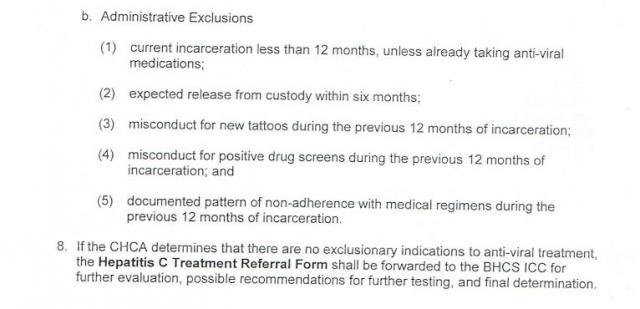

| Online: | |
| Visits: | |
| Stories: |

| Story Views | |
| Now: | |
| Last Hour: | |
| Last 24 Hours: | |
| Total: | |
Pennsylvania’s Barbaric Protocol for Non-Treatment of Prisoners with Hep-C
Dave Lindorff
One of the most astonishing things to come out of a three-day hearing in federal court in Scranton, where noted prisoner-for-life Mumia Abu-Jamal was last month seeking an injunction to force the Pennsylvania Department of Corrections to provide him with medication to treat his raging Hepatitis-C infection was the discovery that the state has been withholding that life-saving treatment not just from him but from almost all of the 6-7000 inmates in state prisons who have active Hep-C cases, and that the state’s doing this not just for medical reasons, but as punishment for prisoners found guilty of “misconduct” or suffering from any “addiction.”
Word of this medieval and sadistic approach to medical care for prisoners in a state that as a colony and later as a young state in the new nation of the United States of America had pioneered humane punishment came late in the hearing when the attorney for the DOC, Laura Neal, admitted that she had at her desk in the courtroom a copy of a “protocol” for treatment of Hep-C.
At first, Neal was not even going to admit that there was such a protocol. In fact, under cross-examination by Abu-Jamal’s attorneys, a DOC witness testified that the state had until 22 months earlier been at least offering some infected inmates treatment with the then best medical option — interferon — but that even this had been halted because of medical studies concluding that it wasn’t very effective and that the side-effects could be worse than the cure.
This was, it turned out, only half the story, though. The actual national medical guidelines in question had said to stop using interferon all right, but the other part of those new guidelines said the reason for dropping interferon treatments was precisely because by 2013 there were several new medications available that have few side effects and that offer cure rates for Hep-C as high as 95% of those treated.
The Pennsylvania DOC, however, simply stopped treating prisoners at all, and didn’t offer the new medicines.
Once she had conceded that she had in her possession a new November 2015 DOC protocol for treating Hep-C, Atty. Neal told Federal District Judge Robert Mariani she didn’t want to have it placed into evidence, except if it were sealed from public view. She said she was only planning to use it in questioning the state’s expert witness, and didn’t intend it to be entered into evidence in the case.
Pressed further about her reason for wanting to keep the protocol secret, Neal admitted she didn’t want it “getting into the hands” of a legal team that has filed a class-action suit in western Pennsylvania seeking to compel the DOC to provide the new medication to all infected prisoners in its facilities, where, as in the US prison system nationwide, there now is a raging Hep-C epidemic.
The judge was not sympathetic to this argument and ordered her to provide the protocol to the court, unsealed.
 Section of the Pennsylvania DOC's treatment protocol detailing administrative reasons for denying Hep-C medical treatment to prisoners
Section of the Pennsylvania DOC's treatment protocol detailing administrative reasons for denying Hep-C medical treatment to prisoners
A news collective, founded as a blog in 2004, covering war, politics, environment, economy, culture and all the madness
Source: http://thiscantbehappening.net/node/2986


